虚拟语气讲解(整理)
(完整版)英语虚拟语气语法归纳总结
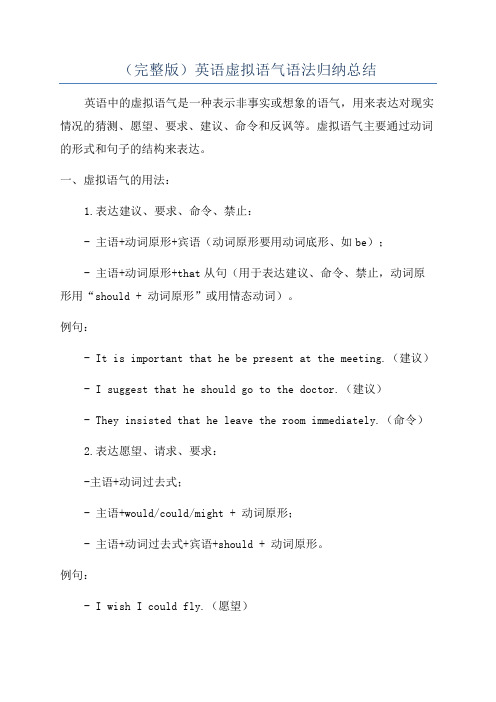
(完整版)英语虚拟语气语法归纳总结英语中的虚拟语气是一种表示非事实或想象的语气,用来表达对现实情况的猜测、愿望、要求、建议、命令和反讽等。
虚拟语气主要通过动词的形式和句子的结构来表达。
一、虚拟语气的用法:1.表达建议、要求、命令、禁止:- 主语+动词原形+宾语(动词原形要用动词底形、如be);- 主语+动词原形+that从句(用于表达建议、命令、禁止,动词原形用“should + 动词原形”或用情态动词)。
例句:- It is important that he be present at the meeting.(建议)- I suggest that he should go to the doctor.(建议)- They insisted that he leave the room immediately.(命令)2.表达愿望、请求、要求:-主语+动词过去式;- 主语+would/could/might + 动词原形;- 主语+动词过去式+宾语+should + 动词原形。
例句:- I wish I could fly.(愿望)- I would appreciate it if you could help me.(请求)3.表示虚拟条件:- If条件从句中的谓语动词用过去完成时,主句用would/should/might/could + have + 过去分词;- If条件从句中的谓语动词用过去时,主句用would/should/could + 动词原形。
例句:- If I had known his phone number, I would have called him.(虚拟条件)- If you had listened to me, we could have finished the project earlier.(虚拟条件)4.表达建议、要求、祝愿:- If only内部称述 + 主语 + 过去式。
高中英语之虚拟语气详细讲解
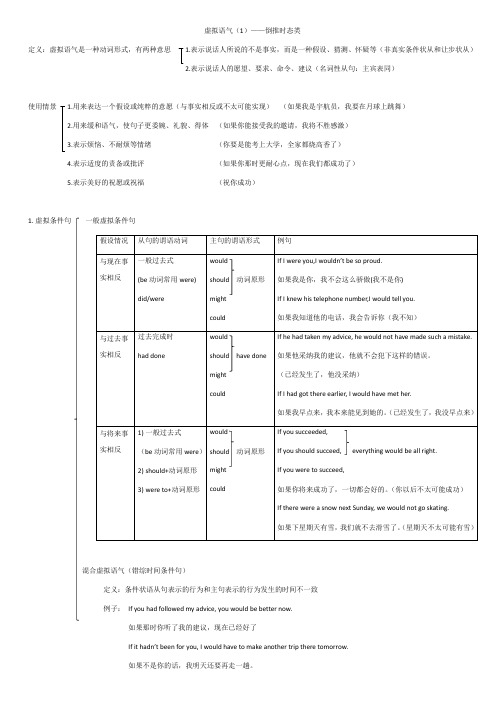
虚拟语气(1)——倒推时态类定义:虚拟语气是一种动词形式,有两种意思 1.表示说话人所说的不是事实,而是一种假设、猜测、怀疑等(非真实条件状从和让步状从)2.表示说话人的愿望、要求、命令、建议(名词性从句:主宾表同)使用情景 1.用来表达一个假设或纯粹的意愿(与事实相反或不太可能实现)(如果我是宇航员,我要在月球上跳舞)2.用来缓和语气,使句子更委婉、礼貌、得体(如果你能接受我的邀请,我将不胜感激)3.表示烦恼、不耐烦等情绪(你要是能考上大学,全家都烧高香了)4.表示适度的责备或批评(如果你那时更耐心点,现在我们都成功了)5.表示美好的祝愿或祝福(祝你成功)1.虚拟条件句一般虚拟条件句混合虚拟语气(错综时间条件句)定义:条件状语从句表示的行为和主句表示的行为发生的时间不一致例子:If you had followed my advice, you would be better now.如果那时你听了我的建议,现在已经好了If it hadn’t been for you, I would have to make another trip there tomorrow.如果不是你的话,我明天还要再走一趟。
If you had studied hard before,you would be a college student now.如果你以前努力学习的话,你现在就是大学生了。
省略+倒装当虚拟条件句的谓语动词中含有were,should,had时,if可以省略,并将were,should,had提前于句首,变为倒装句。
如果虚拟条件句是否定句,not 保留在原处If he should agree to go there, we should send him there.= Should he agree to go there,we should send him there.If she were there,she would agree with us.= Were she were, she would agree with us.If he had learnt about computers,we would have hired him.= Had he learnt about computers,we would have hired him.含蓄虚拟条件句定义:有时为了表达的需要,在虚拟语气中并不总是出现if引导的条件状语从句,而是通过其他手段来代替条件从句分类:1) but for....=(If it+be not for) ;without;Without your help ,we couldn’t have finished the work ahead of time.= But for your help,we couldn’t have finished the work ahead of time.= If it hadn’t been for your help,we couldn’t have finished the work ahead of time.没有你的帮助,我们不可能完成任务。
虚拟语气用法总结及详细解析
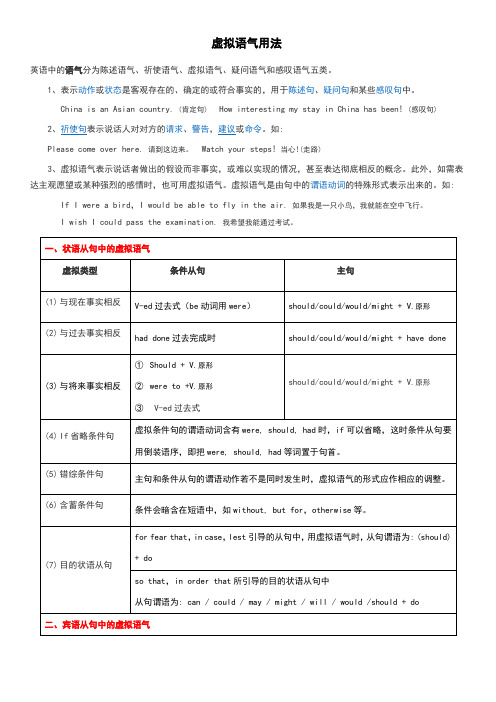
虚拟语气用法英语中的语气分为陈述语气、祈使语气、虚拟语气、疑问语气和感叹语气五类。
1、表示动作或状态是客观存在的、确定的或符合事实的,用于陈述句、疑问句和某些感叹句中。
China is an Asian country. (肯定句) How interesting my stay in China has been! (感叹句)2、祈使句表示说话人对对方的请求、警告,建议或命令。
如:Please come over here. 请到这边来。
Watch your steps! 当心!(走路)3、虚拟语气表示说话者做出的假设而非事实,或难以实现的情况,甚至表达彻底相反的概念。
此外,如需表达主观愿望或某种强烈的感情时,也可用虚拟语气。
虚拟语气是由句中的谓语动词的特殊形式表示出来的。
如: If I were a bird,I would be able to fly in the air. 如果我是一只小鸟,我就能在空中飞行。
I wish I could pass the examination. 我希望我能通过考试。
If there were a heavy snow next Sunday, we would not go skating. 如果下周日下大雪,我们就不能去滑冰了。
If she were to be here next Monday, I would tell her about the matter.如果她下周一来这儿的话,我就会告诉她这件事的始末。
4、有时,虚拟条件句中,结果主句和条件从句的谓语动作若不是同时发生时,虚拟语气的形式应作相应的调整。
这种条件句叫错综条件句。
①从句的动作与过去事实相反,而主句的动作与现在或现在正在发生的事实不符。
If I had worked hard at school, I would be an engineer, too.如果我在学校学习刻苦的话,我现在也会成为一个工程师了If they had informed us, we would not come here now. 如果他们通知过我们的话,我们现在就不会来这里了。
最经典最清晰虚拟语气讲解
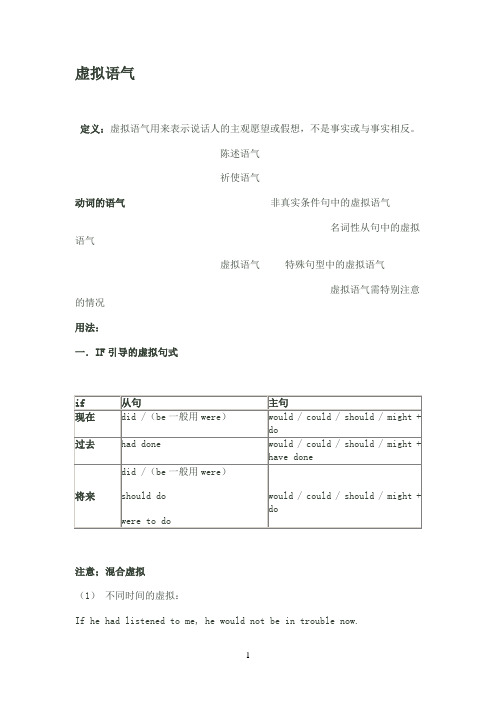
虚拟语气定义:虚拟语气用来表示说话人的主观愿望或假想,不是事实或与事实相反。
陈述语气祈使语气动词的语气非真实条件句中的虚拟语气名词性从句中的虚拟语气虚拟语气特殊句型中的虚拟语气虚拟语气需特别注意的情况用法:一.IF引导的虚拟句式注意;混合虚拟(1)不同时间的虚拟:If he had listened to me, he would not be in trouble now.If he had told me yesterday, I should know what to do now.(2) 虚拟与陈述的混合:He could have passed the exam, but he wasn’t careful enough. You should have come earlier, the bus left a moment ago.二.名词性从句中的虚拟语气:从句谓语动词(should) +do1.主语从句:it is + adj + that结构2.宾语从句:主语+要求接虚拟语气的动词+that一个坚持:insist两个命令:order; command 两个决定:decide; determine三个建议:suggest; advise; propose四个要求:demand; ask; request; require注意:① suggest:暗示;insist:坚持说(不虚拟)② except, believe, think suspect等动词的否定形式或疑问句后面的宾语从句要用虚拟。
I never thought that he should be such a brave young solider③ should竟然I am glad that your novel should have won the first prize.④ wish引导从句的虚拟语气,谓语动词变化和if从句虚拟语气一样。
虚拟语气语法总结
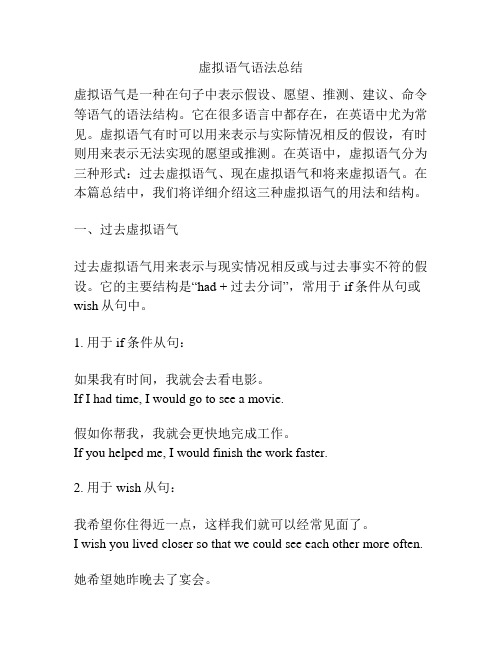
虚拟语气语法总结虚拟语气是一种在句子中表示假设、愿望、推测、建议、命令等语气的语法结构。
它在很多语言中都存在,在英语中尤为常见。
虚拟语气有时可以用来表示与实际情况相反的假设,有时则用来表示无法实现的愿望或推测。
在英语中,虚拟语气分为三种形式:过去虚拟语气、现在虚拟语气和将来虚拟语气。
在本篇总结中,我们将详细介绍这三种虚拟语气的用法和结构。
一、过去虚拟语气过去虚拟语气用来表示与现实情况相反或与过去事实不符的假设。
它的主要结构是“had + 过去分词”,常用于if条件从句或wish从句中。
1. 用于if条件从句:如果我有时间,我就会去看电影。
If I had time, I would go to see a movie.假如你帮我,我就会更快地完成工作。
If you helped me, I would finish the work faster.2. 用于wish从句:我希望你住得近一点,这样我们就可以经常见面了。
I wish you lived closer so that we could see each other more often. 她希望她昨晚去了宴会。
She wishes she had gone to the party last night.二、现在虚拟语气现在虚拟语气用来表示与现实情况相反或不太可能实现的愿望、建议、要求等。
它的主要结构是“should + 动词原形”或“were + to + 动词原形”。
1. 用于虚拟的愿望:如果我是你,我会马上辞职。
If I were you, I would quit my job immediately.(“were”表示与现实情况相反的假设)我希望你明白我的意思。
I wish you understood what I mean.(“understood”表示与现实情况不符的愿望)2. 用于虚拟的建议和要求:你应该尽早去看医生。
虚拟语气总结

虚拟语气总结虚拟语气是英语语法中的一种特殊语态,用来表达一种假设、愿望、建议、命令、怀疑或可能性的情态。
在句子中,虚拟语气主要通过动词的形态变化和句子结构来表示。
一、虚拟语气的形态变化:1. 过去虚拟语气:主要用于表示与事实相反的情况或不可能实现的愿望。
形式为:had + 过去分词。
例如:“If I had enough money, I would travel around the world.”2. 现在虚拟语气:主要用于表示与现在事实相反的情况或不可能实现的愿望。
形式为:动词原形+过去式。
例如:“If I were you, I would study harder.”3. 条件句中的虚拟语气:主要用于表示条件句中的假设情况。
形式为:should/would/could/might + 动词原形。
例如:“If it should rain tomorrow, we would stay at home.”二、虚拟语气的用法:1. 表达与现在事实相反的情况:使用“were”作为虚拟语气动词,无论主语是单数还是复数。
例如:“If I were you, I would apologize.”2. 表达与过去事实相反的情况:使用“had”作为虚拟语气动词。
例如:“If I had studied harder, I would have passed the exam.”3. 表达不可能实现的愿望:使用虚拟语气动词的适当形式来表示愿望、建议或命令。
例如:“I wish I were taller.” “If only I could speak French.” “She demanded that he leave immediately.”4. 表达估计、推测、怀疑或建议:使用虚拟语气动词的适当形式来表示可能性。
例如:“It is important that he arrive on time.” “She suggested that we go to the cinema.”三、虚拟语气的注意事项:1. 注意一致性:在条件从句中,主句和从句的动词形式要保持一致。
(完整版)虚拟语气详解
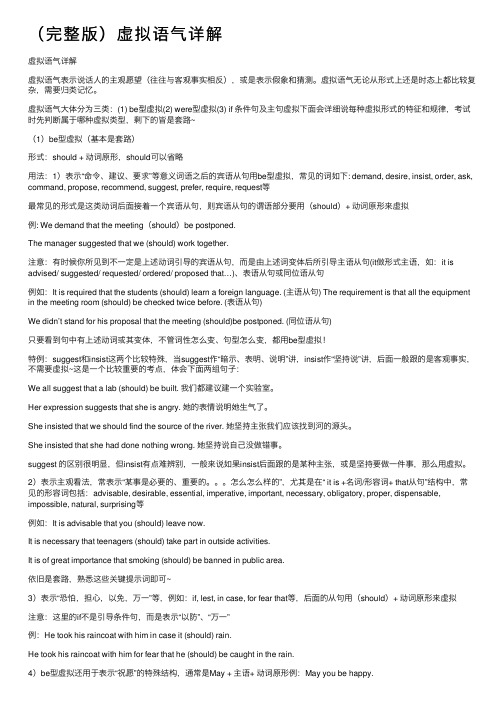
(完整版)虚拟语⽓详解虚拟语⽓详解虚拟语⽓表⽰说话⼈的主观愿望(往往与客观事实相反),或是表⽰假象和猜测。
虚拟语⽓⽆论从形式上还是时态上都⽐较复杂,需要归类记忆。
虚拟语⽓⼤体分为三类:(1) be型虚拟(2) were型虚拟(3) if 条件句及主句虚拟下⾯会详细说每种虚拟形式的特征和规律,考试时先判断属于哪种虚拟类型,剩下的皆是套路~(1)be型虚拟(基本是套路)形式:should + 动词原形,should可以省略⽤法:1)表⽰“命令、建议、要求”等意义词语之后的宾语从句⽤be型虚拟,常见的词如下: demand, desire, insist, order, ask, command, propose, recommend, suggest, prefer, require, request等最常见的形式是这类动词后⾯接着⼀个宾语从句,则宾语从句的谓语部分要⽤(should)+ 动词原形来虚拟例: We demand that the meeting(should)be postponed.The manager suggested that we (should) work together.注意:有时候你所见到不⼀定是上述动词引导的宾语从句,⽽是由上述词变体后所引导主语从句(it做形式主语,如:it is advised/ suggested/ requested/ ordered/ proposed that…)、表语从句或同位语从句例如:It is required that the students (should) learn a foreign language. (主语从句) The requirement is that all the equipment in the meeting room (should) be checked twice before. (表语从句)We didn’t stand for his proposal that the meeting (should)be postponed. (同位语从句)只要看到句中有上述动词或其变体,不管词性怎么变、句型怎么变,都⽤be型虚拟!特例:suggest和insist这两个⽐较特殊,当suggest作“暗⽰、表明、说明”讲,insist作“坚持说”讲,后⾯⼀般跟的是客观事实,不需要虚拟~这是⼀个⽐较重要的考点,体会下⾯两组句⼦:We all suggest that a lab (should) be built. 我们都建议建⼀个实验室。
虚拟语气超详细讲解
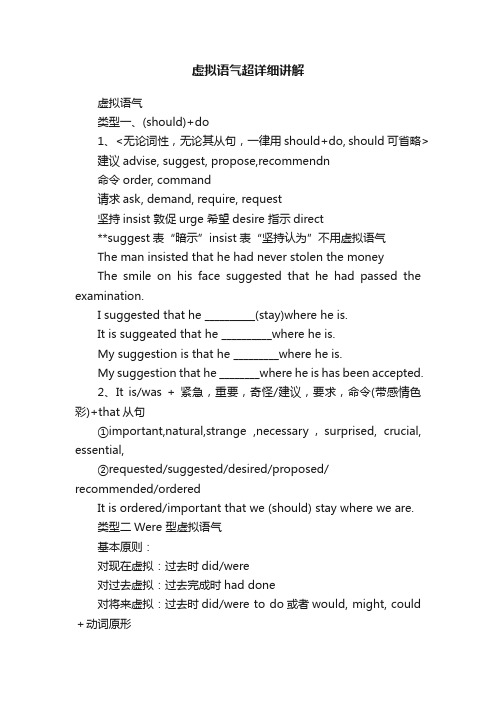
虚拟语气超详细讲解虚拟语气类型一、(should)+do1、<无论词性,无论其从句,一律用should+do, should可省略>建议advise, suggest, propose,recommendn命令order, command请求ask, demand, require, request坚持insist 敦促urge 希望desire 指示direct**suggest表“暗示”insist表“坚持认为”不用虚拟语气The man insisted that he had never stolen the moneyThe smile on his face suggested that he had passed the examination.I suggested that he __________(stay)where he is.It is suggeated that he __________where he is.My suggestion is that he _________where he is.My suggestion that he ________where he is has been accepted.2、It is/was + 紧急,重要,奇怪/建议,要求,命令(带感情色彩)+that从句①important,natural,strange ,necessary,surprised, crucial, essential,②requested/suggested/desired/pro posed/ recommended/orderedIt is ordered/important that we (should) stay where we are.类型二Were 型虚拟语气基本原则:对现在虚拟:过去时did/were对过去虚拟:过去完成时had done对将来虚拟:过去时did/were to do或者would, might, could +动词原形1. if 条件句中的虚拟时间从句谓语形式主句谓语形式将来动词过去式(be用were)should + 动词原形were to + 动词原形would / should / might / could + 动词原形现在动词过去式(be 用were) would / should / might / could + 动词原形过去had +动词过去分词would / should / might / could have + 动词过去分词1.1 与现在事实不一致,其句型为:If +主语+did ,主语+should (could, would, 或might )+do .If I were you, I would study hard. (可倒装)If it rained, I would not be here now.1.2 与过去事实不一致,句型为:If +主语+had +done ,主语+should (could, would, 或might )+have +done. If the doctor had come last night, the boy would have been saved. (可倒装)1.3 将来事实不一致,句型为:If should were to 主语++do ,主语+should (could ,would, 或might )+do. If it should rain tomorrow, we would stay at home.(可倒装)If I were to go to the moon one day, I could see it with my own eyes.(可倒装) If you missed the film to night, you would feel sorry.(混合虚拟)难点:①在条件句中如果出现were, had, should 可省去if ,将主语与这些词倒装 Had the doctor come last night , the boy would havesaved.Were I to go to the moon one day , I would see it with my own eyes.Should it rain tomorrow , we would stay at home.②当条件状语从句表示的行为和主句表示的行为所发生的时间不一致时,被称为“错综时间条件句”,常常表现为if+过去虚拟+主句现在虚拟If you had followed my advice, you would be better now.If you had studied hard before, you would be a college student now.2. wish 后面的宾语从句中与现在愿望不一致: 主语+did ; I wish I were you.与过去愿望不一致: 主语+had +done ;I wish I had visited the white House when I was in the states.与未来愿望不一致: 主语+would (could )+do 。
英语语法—虚拟语气(最全)
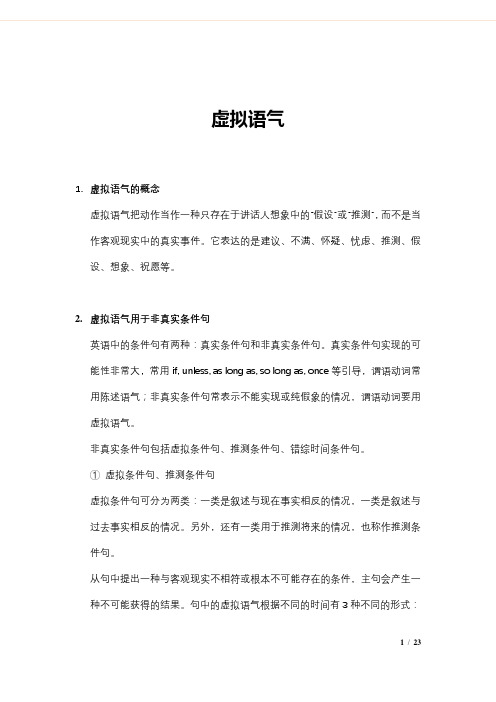
虚拟语气1.虚拟语气的概念虚拟语气把动作当作一种只存在于讲话人想象中的“假设”或“推测”,而不是当作客观现实中的真实事件。
它表达的是建议、不满、怀疑、忧虑、推测、假设、想象、祝愿等。
2.虚拟语气用于非真实条件句英语中的条件句有两种:真实条件句和非真实条件句。
真实条件句实现的可能性非常大,常用if, unless, as long as, so long as, once等引导,谓语动词常用陈述语气;非真实条件句常表示不能实现或纯假象的情况,谓语动词要用虚拟语气。
非真实条件句包括虚拟条件句、推测条件句、错综时间条件句。
①虚拟条件句、推测条件句虚拟条件句可分为两类:一类是叙述与现在事实相反的情况,一类是叙述与过去事实相反的情况。
另外,还有一类用于推测将来的情况,也称作推测条件句。
从句中提出一种与客观现实不相符或根本不可能存在的条件,主句会产生一种不可能获得的结果。
句中的虚拟语气根据不同的时间有3种不同的形式:I would lend him the money if he asked me.他要是问我,我愿意借钱给他。
(意愿)If he had time, he should do it.要是有时间,他愿意做那件事。
(意愿)He could move the big stone if he should try.努力的话,他能搬动那块大石头。
(能力)If he forgot to come, you could go instead.他要是忘了没来,你可要替他来。
(许诺)A.与现在事实相反If I had enough money, I would buy a computer.如果我有足够的钱,我将买一台电脑。
(实际上没有) Were I you I would refuse.如果我是你我会拒绝。
(我不是你)注:从句有时可用If it were not for这种句型,表示“若不是……”。
It it weren’t for your help, we would be in serious trouble.若不是你帮忙,我们会遇到大麻烦。
高中英语语法-虚拟语气全总结

高中英语语法-虚拟语气全总结虚拟语气用于表示与现实相反的假设。
在非真实条件句中,如果从句表示与现在事实相反的假设,主句应该使用XXX动词原形。
例如,如果我有时间,我会参加会议。
如果你是我,你会抓住出国的机会。
如果从句表示与过去事实相反的假设,主句应该使用主语+XXX过去分词。
例如,如果你听从了我的建议,你就不会在考试中失败了。
如果从句表示与将来事实相反的假设,主句应该使用主语+XXX动词原形。
例如,如果你明天来,我们就会开会。
如果明天下雨,我们就会推迟运动会。
如果他明天不来,我们就会推迟会议到下周一。
有时候,条件状语从句和主句所表示的时间不一致,这时候被称为错综时间条件句。
动词的形式要根据它所表示的时间作出相应的调整。
例如,如果你刚才听从了我的建议,你现在会更好。
如果你之前努力研究,你现在就是一名大学生了。
在条件句中,可以省略if,把were、had、should提到句首,变成倒装句式。
例如,如果我还有上学的机会,我会更加努力研究。
→Were I at school again。
I would study harder.Had you arrived earlier。
you would have caught the bus.If it rains tomorrow。
we won't be able to go climbing.What would you do if you had a n dollars?Without your help。
we XXX the work ahead of time.I was ill that day。
otherwise I XXX.He called me to inform me about your birthday。
or else I wouldn't have known about it.A man who s drinking water would be dead in about seven days.I might have been able to offer you more assistance。
虚拟语气经典总结

非真实条件句
与现在事实相反,条件从句的形式用过去式(有时用were),主句用“should(would, could, might)+ 动词原形”;与过去事实相反,条件从句的形式用过去完成时,主句用“should(would, could, might) +have+过去分词”;与将来事实相反,条件从句的形式用“should(were to)+动词原形”或只用一般过
将来条件句
表示与将来事实相反的假设,从句用一般过去时或 should + 动词原形(通常省略should),主句用
“would/should/could/might + 动词原形”。
输标02入题
如果从句中有be动词,无论主语是单数还是复数,都 用were。
01
03
有时也可以用“were to + 动词原形”来表示与将来 事实相反的假设。
倒装句和省略句中的虚拟语气
01
02
03
在倒装句中,虚拟语气通常出现 在if条件句的倒装形式中,即把if 省略,把were, had或should等 提到句首。
省略句中,虚拟语气可以省略if, 把were, had或should等提到句 首,形成倒装形式。
虚拟语气的形式根据时态和条件 的不同而有所变化。
04
如果主句中有情态动词must或have to,则需要将它 们改为相应的过去式,即must改为would have, have to改为had to。
03
名词性从句中虚拟语气应用
主语从句
谓语动词用单数
当主语从句表达的是虚拟语气时,谓语动词通 常使用单数形式,即使主语是复数。
虚拟语气的时态
虚拟语气讲解(整理)

(3)虚拟语气在 在主语从句中
A.在句型 “It is important (necessary, strange, natural) that .... ” 中,that 后面的从句中的谓语动词 用: should + 动词原形
1. 我们有必要出去散散步。 It’s necessary that we should have a walk now.
2.用于表示命令、建议、要求等一类词后面的宾语从句。 insist, order, command, suggest, advise, propose, require, request, demand, desire etc.
We suggested that the meeting (should) be put off.
7. It is of the utmost importance that you ______ here on time. a. be b. shall be c. are to be d. must be
三、虚拟语气在其他从句中
1. It is (high / about ) time that…从句中的谓 语动词用过去式或should+动词原形,should 不能省略. It is high time that you went / should go to school.
I would rather you told me the truth. I would rather you had gone there last Sunday.
4. as if ( as though) 看起来 常用虚拟形式,即 表示与现在事实相反,用过去式;与过去事实相反 用过去完成式 (had done).
英语虚拟语气知识点总结

英语虚拟语气知识点总结一、虚拟语气的概念:虚拟语气,是指表示说话者所说的情况并非现实或已经发生,或在说话时还不确定是否实现的一种语态。
其特点是句子中的动词形式属于虚拟语气。
二、虚拟语气的表达:1. 条件虚拟语气:表示与现在或未来事实相反的虚拟情况。
(1)主句用过去时,从句用过去完成时。
If I had known the truth, I would not have believed him.(如果我知道了真相,我就不会相信他了。
)(2)主句用过去式,从句用“had+过去分词”。
If he had worked harder, he would have passed the exam.(如果他更加努力学习的话,他就能够通过这个考试。
)2. 虚拟假设语气:表示想像中与现在或将来相反的事情。
(1)主句用过去时,从句用过去式。
If I knew his address, I would go there and see him now.(如果我知道他的地址的话,我现在就会去找他了。
)(2)主句用were,表示与过去的虚拟情况相反。
If I were you, I would study hard.(如果我是你的话,我会好好学习。
)3. 祝愿虚拟语气:表示转化为现实的愿望。
(1)主句用过去式,从句用过去完成式。
I wish I had known him earlier.(我希望我更早认识他。
)(2)主句用过去式,从句用would / could +动词原形。
I wish he could help me with my English.(我希望他能够帮助我学习英语。
)4. 建议虚拟语气:表示对假设的结果的建议。
If I were you, I would work harder.(如果我是你的话,我会更加努力工作。
)5. 明确表示否定的虚拟语气:If they didn’t arrive on time, they would miss the plane.(如果他们没按时到达,他们将会错过飞机。
初中英语语法知识总结之虚拟语气

初中英语语法知识总结之虚拟语气虚拟语气是英语中的一种特殊语气,用于表示与事实相反的假设、愿望、建议、命令等。
在初中英语中,虚拟语气是一个重要的语法知识点,掌握好虚拟语气的用法可以帮助我们更准确地表达自己的意思。
下面是对初中英语虚拟语气的相关知识总结。
一、虚拟语气的用法1.与现在事实相反的虚拟语气(与现在事实相反的假设)表示对现在情况的否定、假设或建议。
a) 与现在动作情况相反:If I were you, I would study harder.(如果我是你,我会更加努力学习。
)注意:“were”在这里被用作“was”的虚拟形式,表示与现在事实相反的假设。
b) 与现在实际情况相反:I wish I had more time.(我希望我有更多时间。
)注意:“I wish”后跟的是“had”,表示现在我没有更多时间的愿望。
2.与过去事实相反的虚拟语气(与过去事实相反的假设)表示对过去情况的否定、假设或建议。
a) 与过去动作情况相反:If I had studied harder, I would have passed the exam.(如果我当初学得更努力,我就能通过这次考试了。
)b) 与过去实际情况相反:I wish I had listened to my parents.(我希望我当初听了我的父母的话。
)3.与将来事实相反的虚拟语气(与将来事实相反的假设)表示对将来情况的否定、假设或建议。
a) 表示对将来情况的不可能性:If it were to rain tomorrow, we would cancel the picnic. (如果明天下雨,我们就会取消野餐计划。
)b) 表示对将来情况的愿望:I hope I will pass the exam. (我希望我能通过考试。
)二、虚拟语气的常见句型1. If only + 过去式表示很遗憾没有实现过去的愿望。
例如:If only I had listened to my teacher's advice, I would not have made such a mistake.(要是我当初听从了老师的建议,就不会犯这样的错误了。
虚拟语气归纳总结

虚拟语气在主语从句、宾语从句等中运用
主语从句中虚拟语气的使用
当主语从句表达与事实相反的情况时,谓语动词用虚拟语气,其形式通常为“should + 动词原 形”或只用动词原形(美国英语)。
宾语从句中虚拟语气的使用
当宾语从句表达与事实相反的情况时,谓语动词也用虚拟语气,其形式与主语从句相同。
表语从句和同位语从句中虚拟语气的使用
忽略从句类型
定语从句分为限制性和非限制性两种,不同类型的从句在 使用虚拟语气时有所不同。如果在应该使用虚拟语气的从 句中忽略了这一点,就会导致语法错误。如:“The plan, which I suggest, should be carried out immediately.” (我建议的计划应该立即执行。)这个句子中,非限制性 定语从句“which I suggest”没有使用虚拟语气,因此是 错误的。正确的表达应该是:“The plan, which I suggest should be carried out immediately, is very important.”(我建议应该立即执行的计划非常重要。)
典型错误分析
误用虚拟语气
在非正式场合或口语中,有时会用虚拟语气表达强烈的愿 望或假设,但在正式书面语中,需要根据语境恰当使用。 如:“I wish I was a millionaire.”(我希望我是个百万 富翁。)这种表达在口语中常见,但在正式书面语中应改 为:“I wish I were a millionaire.”
忽略虚拟语气的特殊形式
在使用虚拟语气时忽略了其特殊形式,如 “should + 动词原形”或只用动词原形( 美国英语)。
04
虚拟语气在定语从句中应用
英语虚拟语气语法总结
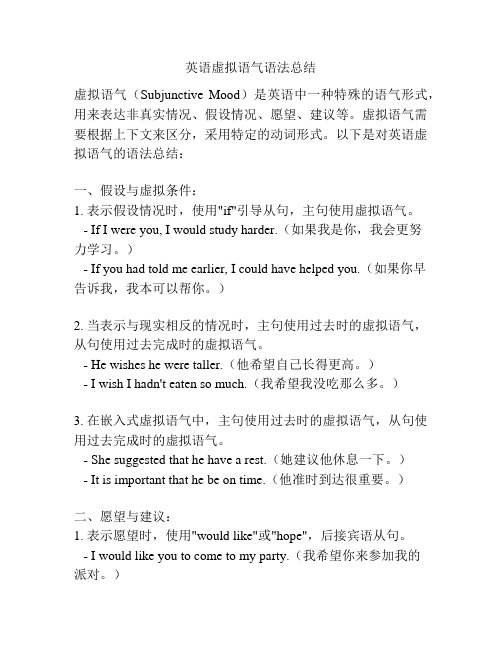
英语虚拟语气语法总结虚拟语气(Subjunctive Mood)是英语中一种特殊的语气形式,用来表达非真实情况、假设情况、愿望、建议等。
虚拟语气需要根据上下文来区分,采用特定的动词形式。
以下是对英语虚拟语气的语法总结:一、假设与虚拟条件:1. 表示假设情况时,使用"if"引导从句,主句使用虚拟语气。
- If I were you, I would study harder.(如果我是你,我会更努力学习。
)- If you had told me earlier, I could have helped you.(如果你早告诉我,我本可以帮你。
)2. 当表示与现实相反的情况时,主句使用过去时的虚拟语气,从句使用过去完成时的虚拟语气。
- He wishes he were taller.(他希望自己长得更高。
)- I wish I hadn't eaten so much.(我希望我没吃那么多。
)3. 在嵌入式虚拟语气中,主句使用过去时的虚拟语气,从句使用过去完成时的虚拟语气。
- She suggested that he have a rest.(她建议他休息一下。
)- It is important that he be on time.(他准时到达很重要。
)二、愿望与建议:1. 表示愿望时,使用"would like"或"hope",后接宾语从句。
- I would like you to come to my party.(我希望你来参加我的派对。
)- She hopes that the weather will be good tomorrow.(她希望明天天气会好。
)2. 表示建议时,使用"should"或"would rather"等,后接宾语从句。
- I suggest that you see a doctor.(我建议你去看医生。
英语虚拟语气最全讲解

C. It is /was 某些动词的过去分词+that适用于这一句型 的动词的过去分词常用:suggested, requested, proposed, desired, ordered, decided等,如:
It’s requested that Mr.Wang (should) give a performance at the party. It was arranged that they should leave the following week. It has been decided that the meeting should be postponed till next Saturday.
had+过去分词
将来式 should/would/might/could+动词原形 (在主句谓语动词之前发生)
ห้องสมุดไป่ตู้
I wish I were/was as strange as you. 我希望象你一样健壮。 How I wish it was not raining! 现在如果不下雨多好啊。 I wish I remembered the address. 我要是记得地址就好了。 I wish he hadn’t gone. 他要是没去该多好。 He wished you would go and see him. 他愿你去看看他。 Monica wished she hadn’t come. 莫妮卡愿她没来过。
2 虚拟语气在虚拟条件句与结果主句中的谓语动词 形式。 条件句中的 结果主句中的 谓语动词 谓语动词
与现在事实相反 动词过去式 ( be用were) had+过去分词
虚拟语气用法梳理

虚拟语气用法梳理虚拟语气是指表达一种假设、愿望、建议、命令、怀疑、推测等非事实情况的语气。
在汉语中,通过词语的选择、语序的改变、虚构语气词等手段来表达虚拟语气。
在英语中,虚拟语气的表达更加规范和明确,有一套独特的语法规则和结构。
一、对过去的虚拟1. 虚拟的动词形式:- 过去式(简单过去时态)常用于表达与过去事实相反的情况,如:I wish I were taller.(我但愿我更高。
)- 过去完成时(had + 过去分词)常用于表示对过去情况的假设,如:If I had studied harder, I would have passed the exam.(如果我当时更努力学习,我就能通过考试。
)- would have + 过去分词用于对过去的事实进行猜测,如:He looks pale as if he would have seen a ghost.(他看起来苍白,好像是看到了鬼。
)2. 虚拟的连接词:- If only(要是...就好了)常用于表达遗憾的气氛,如:If only I had known the truth earlier, I wouldn't have made such a mistake.(要是我早点知道真相,就不会犯这样的错误了。
)- as if / though(好像,仿佛)常用于描述虚构或推测的情况,如:She behaves as if she were the boss.(她的行为好像她是老板。
)二、对现在的虚拟1. 虚拟的动词形式:- 一般现在时(主语+动词原形)与现在事实相反的情况,如:She speaks French as if she were a native speaker.(她说法语就好像是当地人一样。
)- should + 动词原形用于虚拟条件,如:If it should rain, the game would be canceled.(如果下雨的话,比赛将被取消。
虚拟语气知识点总结
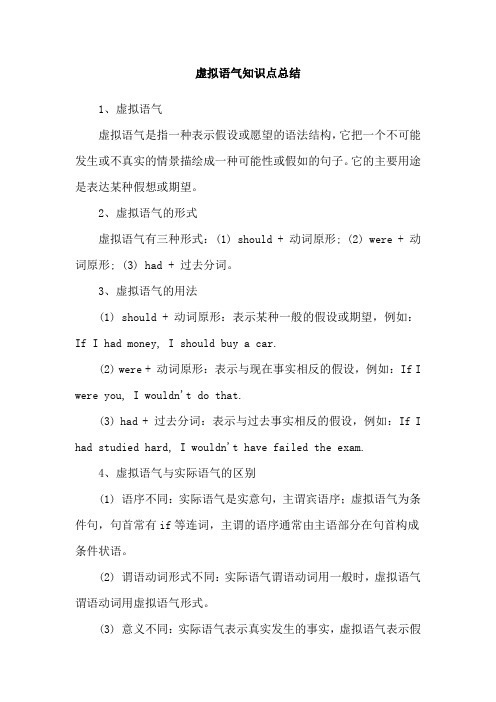
虚拟语气知识点总结
1、虚拟语气
虚拟语气是指一种表示假设或愿望的语法结构,它把一个不可能发生或不真实的情景描绘成一种可能性或假如的句子。
它的主要用途是表达某种假想或期望。
2、虚拟语气的形式
虚拟语气有三种形式:(1) should + 动词原形; (2) were + 动词原形; (3) had + 过去分词。
3、虚拟语气的用法
(1) should + 动词原形:表示某种一般的假设或期望,例如:If I had money, I should buy a car.
(2) were + 动词原形:表示与现在事实相反的假设,例如:If I were you, I wouldn't do that.
(3) had + 过去分词:表示与过去事实相反的假设,例如:If I had studied hard, I wouldn't have failed the exam.
4、虚拟语气与实际语气的区别
(1) 语序不同:实际语气是实意句,主谓宾语序;虚拟语气为条件句,句首常有if等连词,主谓的语序通常由主语部分在句首构成条件状语。
(2) 谓语动词形式不同:实际语气谓语动词用一般时,虚拟语气谓语动词用虚拟语气形式。
(3) 意义不同:实际语气表示真实发生的事实,虚拟语气表示假
设或期望。
非常详细的虚拟语气讲解资料

虚拟语气第一部分:语气的定义和种类1 语气(mood)语气是动词的一种形式,表示说话人对某一行为或事情的看法和态度。
2 语气的种类⑴、陈述语气:表示动作或状态是现实的、确定的或符合事实的,用于陈述句、疑问句和某些感叹句。
如:①There are two sides to every question.每个问题都有两个方面。
②Were you busy all day yesterday?昨天一整天你都很忙吗?③How good a teacher she is!她是多好的一位老师啊!⑵、祈使语气:表示说话人对对方的请求或命令。
如:①Never be late again!再也不要迟到了。
②Don’t forget to turn off the light.别忘了关灯。
⑶、虚拟语气:表示动作或状态不是客观存在的事实,而是说话人的主观愿望、假设或推测等。
如:①If I were a bird, I could fly in the air.如果我是一只小鸟,我就能在空中飞行。
②I wish I could pass the examination.我希望我能通过考试。
③May you succeed!祝您成功!虚拟语气在语法里算得上是个难点。
让我们就从最简单的开始吧。
第二部分:简单句中的虚拟语气一、情态动词的过去式用于现在时态时,表示说话人的谦虚、客气、有礼貌、或委婉的语气,常用于日常会话中。
如:⑴.Would you be kind enough to show me the way to the post office?请你告诉我去邮局的路好吗?⑵.It would be better for you not to stay up too late.你最好别熬夜到很晚。
二、表祝愿。
1、常用“may+动词原形”表示祝愿,但愿,此时may须置于句首(多用于正式文体中)。
⑴、May good luck be yours!祝你好运!⑵、May you be happy!祝你快乐!⑶、May you do even better!祝你取得更大成就!⑷、May you have a good time. 祝愿你玩的痛快。
- 1、下载文档前请自行甄别文档内容的完整性,平台不提供额外的编辑、内容补充、找答案等附加服务。
- 2、"仅部分预览"的文档,不可在线预览部分如存在完整性等问题,可反馈申请退款(可完整预览的文档不适用该条件!)。
- 3、如文档侵犯您的权益,请联系客服反馈,我们会尽快为您处理(人工客服工作时间:9:00-18:30)。
5. even if ( even though)即使
Even if he were here, he could not solve the problem.
Even if I had been busy then, I would have helped you.
The Subjunctive Mood
My idea is that we (should ) think it over before accepting it. My suggestion that we (should) have a meeting has been accepted by others. We all agree to that suggestion that the meeting (should) be put off.
3. would rather + 从句
动词用过去式或过去完成时
I would rather you told me the truth.
I would rather you had gone there last Sunday.
4. as if ( as though) 看起来 常用虚拟形式,即 表示与现在事实相反,用过去式;与过去事实相反 用过去完成式 (had done). He treats /treated the boy as if he were his own son. He speaks/ spoke as if he had known about it
The Subjunctive Mood
二、虚拟语气在名词从句中的运用 (1)用于宾语从句 1、wish 后面的宾语从句中。 一般用虚拟语气,表示一种不可能实现的愿望。其谓 语动词形式为:
表现在
表过去
过去时
过去完成时
表将来 would, might, could+动词原形 I wish (that) I were a bird.
与将来 相反的 假设
1、If+主语+动词过去式 主语+should, would 2、If+主语+were to+ 动词原形 3、If+主语+should +动词原形 might, could+动词 原形
eg:If I had time, I would attend the meeting. If he had hurried ,he could have caught the train. If I were to go abroad ,I would go to America. More practice: 如果我是你,我就会努力学习.
2 她这样做是很自然的。 It’s natural that she should do so. 3 重要的是我们要照顾好病人。 It’s important that we should take good care of the patient.
B. 在It is demanded/suggested/ordered/required…. that-clause句型中从句用(should )+动词原型 It is demanded that we should work out a plan.
典型例题
8. It’s time _______ about the traffic problem downtown. a. something was done b. everything is done c. anything will be done d. nothing to be done
If you had come earlier, you would have met him.
Had you come earlier, you would have met him.
If it should rain tomorrow, we would not go climbing. Should it rain tomorrow, we would not go climbing.
典型例题 6. Had he worked harder, he _______ the exams. a. must have got through b. would have got through c. would get through d. could get through 9. _______ for your help, we’d never have been able to get over the difficulties. a. Had it not b. If it were not c. Had it not been d. If we had not been 14. ______ today, he would get there by Friday. a. Would he leave b. Was he leaving c. Were he to leave d. If he leaves
三、虚拟语气在其他从句中
1. It is (high / about ) time that…从句中的谓 语动词用过去式或should+动词原形,should 不能省略. It is high time that you went / should go to school.
2. If only 引导的感叹句(要是...该有多好啊) 表示现在的情况,应用过去式; 如果是过去的情况, 应用过去完成时态 If only I knew the answer! If only I had seen the film yesterday!
The Subjunctive Mood
典型例题
4. Jean doesn’t want to work right away because she thinks that if she ______ a job she probably wouldn’t be able to see her friends very often. a. has to get b. were to get c. had got d. could have got
使用虚拟条件句要注意的几点:
1. 当条件状语从句表示的行为和主句表示的行为 所发生的时间不一致时,被称为:错综时间条件句“, 动词的形式要根据它所表示的时间作出相应的调整. If you had followed my advice , you would be better now. 如果你听我的建议,你现在就会痊愈了. If you had studied hard before, you would be a college student now. 如果你努力学习的话,你现在就会是大学生 了.
(3)虚拟语气在 在主语从句中
A.在句型 “It is important (necessary, strange, natural) that .... ” 中,that 后面的从句中的谓语动词 用: should + 动词原形
1. 我们有必要出去散散步。
It’s necessary that we should have a walk now.
15. If her husband _______ in the war, she would not be helping others with the housework now. a. had not been killed b. hadn’t killed c. wasn’t killed d. would not have been killed
语气 英语的动词一般可带有三种不同的语气:
陈述语气,祈使语气和虚拟语 气。不同的语气用动词的不同形式
(有的还借助句法形式)来表示。
虚拟语气
虚拟语气的概念
虚拟语气是一种特殊的动词形式,一是用来
表示说话人所说的话不是一个事实,而是一 种假设、猜测、怀疑等(在条件从句中或让步 状语从句中);一是表示说话人的愿望、要求、 命令、建议等 (在宾语从句、表语从句、同位 语从句)。
If I were you, I would work harder at my lessons.
如果我知道他的电话号码,我就给他打电话了. If I had known his telephone number, I would have called him. 如果明天下雨的话,我们会取消比赛. If it should \were to rain, we would call off the match.
他脸上的表情表明他对我们的工作很满意.
The man insisted that he had never stolen the money.
那个人坚持说他没有偷钱.
(2)用于表语从句和同位语从句
在suggestion / proposal / order / plan / advice / idea / request 等名词后的表语和同位语从句中要用 “should+动词原形” should可以省略.
2.虚拟语气的省略
在条件句中,可省略 if,把were ,had, should 提到 句首,变为倒装句式. If I were at school again, I would study harder. Were I at school again, I would study harder.
2. I don’t think it advisable that Tom _______ to the job since he has no experience. a. is assigned b. will be assigned c. be assigned d. has been assigned 7. It is of the utmost importance that you ______ here on time. a. be b. shall be c. are to be d. must be
